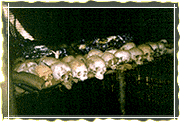 |
 |
 |
|
|||

Rwanda Revisited
Dear Rudy,
For Kigali is in the midst of a building boom. Eucalyptus branches have been stripped of leaves and are used as two-by-fours to form the framework of new homes and office buildings. Humanitarian aid organizations are building too: small villages of mud huts with either tile or tin roofs to house the thousands of returning refugees who fled to neighboring countries to escape the violence. It's hard to believe that five years ago, neighbor turned against neighbor in a bloodbath that left an estimated 800,000 people dead. About 40 minutes outside of Kigali is the Ntrama Church, one of the many genocide memorials in Rwanda. It was here that thousands sought sanctuary after they heard the news on the radio that the plane carrying their president and the president of Burundi had been shot down. No one knew who had done it, no one knew which side would take advantage of the chaos. So Tutsi and Hutu and Twa sought refuge together inside the church. Eventually the Hutu militia showed up and demanded everyone show their identity cards. Hutus were allowed to leave. Everyone else was killed when grenades were lobbed inside.
But right across the road from the church, there was a group of children. I spoke no Kenya-Rwandan. They spoke no English. But we managed to communicate well enough to play the monster game where we take turns crossing our eyes and stretching out our arms Frankenstein style and chasing each other around the trees. They were shy about my microphone. And so was the pack of Boy Scouts I saw marching down the streets of Butare, a town in the south of the country. But no one, absolutely no one in Rwanda, wanted their picture taken. "Why? What will you do with it?" seemed to be the underlying question.
But the latter are brimming with optimism and energy, coming home to Rwanda with a good education and a little bit of capital and grand schemes of starting a business whether it's exporting long stemmed roses or starting a little fish farm. Rudy, I'm still dreaming about Rwanda, about the red dust and the banana trees and the children playing monster games. I think especially about the youngest ones, kids who weren't even alive when the rivers were clogged with corpses. I hope and pray that this silly cross-eyed American is the scariest demon they'll ever have to face.
Best,
|
 | American Public Media Home | Search | How to Listen ©2004 American Public Media | Terms of Use | Privacy Policy |
 Rwanda was not at all what I expected. It looked familiar, somehow, like the foothills of San Diego County. Even the trees were the same:
jacaranda, eucalyptus, avocado, even pine trees. There's even smog in the
capital city of Kigali that shrouds the views of the famous Thousand
Hills. The haze comes from smoky kilns that bake the mountains of
handmade clay bricks that line nearly every road.
Rwanda was not at all what I expected. It looked familiar, somehow, like the foothills of San Diego County. Even the trees were the same:
jacaranda, eucalyptus, avocado, even pine trees. There's even smog in the
capital city of Kigali that shrouds the views of the famous Thousand
Hills. The haze comes from smoky kilns that bake the mountains of
handmade clay bricks that line nearly every road.
 Today there are fragments of the simple stained glass window left.
But when I stuck my head through the holes in the walls, I noticed piles
of rags among the wooden benches. And then I noticed a red plastic bowl, a
child's orange sneakers, and a femur bone. Next door to the church,
there's a small shack where a table has been neatly stacked with row upon
row of skulls. The government has preserved this site and others around
the country so that future generations can never forget.
Today there are fragments of the simple stained glass window left.
But when I stuck my head through the holes in the walls, I noticed piles
of rags among the wooden benches. And then I noticed a red plastic bowl, a
child's orange sneakers, and a femur bone. Next door to the church,
there's a small shack where a table has been neatly stacked with row upon
row of skulls. The government has preserved this site and others around
the country so that future generations can never forget.
 Rudy, I think there are two sorts of Rwandans living in the
country today: those who survived the genocide and expatriates who'd lived
and studied abroad for many years in places like Kenya or Canada. The
former are those like the man I met in the flower shop who has no foot, or
the women walking along the road who stare at you with haunted eyes, as if
to say, "Where were you five years ago? Why didn't you stop the killing?"
Rudy, I think there are two sorts of Rwandans living in the
country today: those who survived the genocide and expatriates who'd lived
and studied abroad for many years in places like Kenya or Canada. The
former are those like the man I met in the flower shop who has no foot, or
the women walking along the road who stare at you with haunted eyes, as if
to say, "Where were you five years ago? Why didn't you stop the killing?"